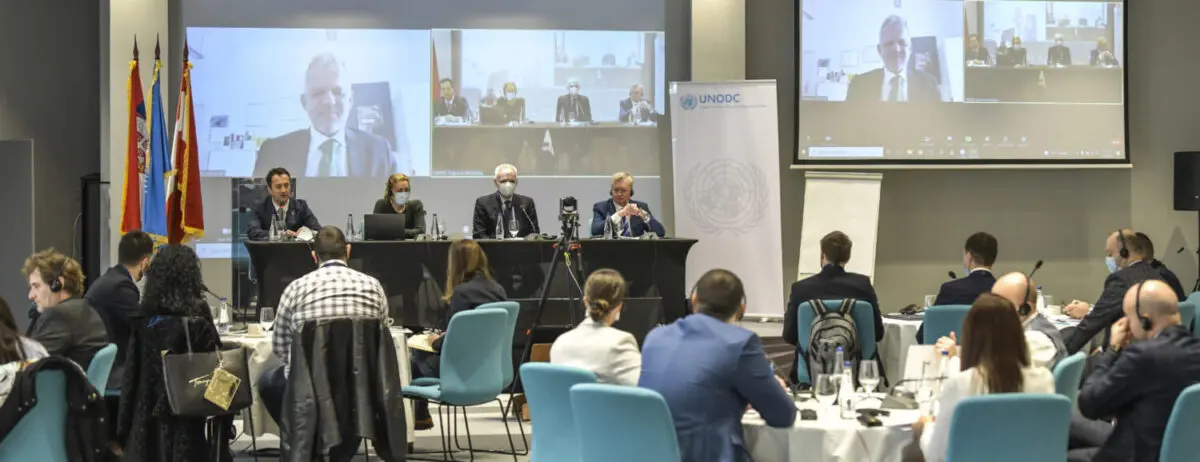Belgrade, (Serbia) 18 – 20 January 2022 – Human trafficking is a global and widespread crime, but despite its prevalence research shows persistent low levels of prosecutions and convictions of traffickers.
Data from the latest Global Report on Trafficking in Persons, produced by the United Nations Office on Drugs and Crime (UNODC), showed that in 2018 almost 50,000 human trafficking victims were detected in 135 countries, while 88 countries reported just over 3,500 convictions.
“Human trafficking is a complex, profitable crime and one that is difficult to prove,” says Davor Raus, a UNODC criminal justice expert. “Challenges to successful prosecutions include limited international cooperation, insufficient or inadmissible evidence and an overreliance on victim testimonies.”
This week in Belgrade, Serbia, police officers and criminal investigators from eleven European countries are being trained how to collect, manage, and analyse evidence from cases of human trafficking that could lead to convictions of the perpetrators.
A further aim of the workshop is to improve cooperation between countries during investigations and criminal proceedings of trafficking cases.
“Law enforcement officials need certain skills to be able to collect the amount and type of evidence that is needed for convictions,” says Davor Raus, who is leading the workshop.
Currently the global trend within the criminal justice system is to rely heavily on verbal or written statements from the victims involved.
“A witness statement can be a powerful piece of evidence, but such a testimony can change over time or be inconsistent. This can weaken the evidence base for a case,” adds Mr. Raus.
He explains that people who have been trafficked are victims of serious trauma. They have been through a painful experience and being interviewed repeatedly to provide a statement could actually lead to “secondary victimization”.
“Investigators and police officers should be looking for other forms of evidence too, and this is one of the main messages of this workshop. We are focussing on how to ensure that physical evidence is legally obtained and handled in a way that makes it admissible in court.”
Physical evidence includes fingerprints that can be analysed for DNA, and items such as money and mobile phones found in the possession of the suspects or at a crime scene.
“If evidence is not collected and preserved adequately and according to national standards it can be rejected in court. A case against a human trafficker could collapse, so this is what is at stake here,” says Davor Raus.
Participants are also learning about the importance of digital evidence in financial investigations that could lead to the ringleaders of a criminal network, as well as evidence that can be obtained from social media networks and private companies.
The three-day event is organized by UNODC in cooperation with the Police Cooperation Convention for South Eastern Europe Secretariat (PCC SEE) and through funding from the Austrian Ministry of European and International Affairs.
The countries of South Eastern Europe, predominantly Romania, Bulgaria, and Serbia, are among the main origins for victims of human trafficking in Austria, where they are exploited in the construction, agriculture, and catering sectors, and forced into prostitution or begging.
“A significant part of the population in the South Eastern Europe region is facing poverty, unemployment, lack of education opportunities and inadequate social and health care,” says UNODC’s Davor Raus.
“Human trafficking groups operating in the region and destination countries prey on such vulnerabilities and the desire to migrate to more wealthy states.”
Manfred Buchner from the Austrian organization MEN-VIA that supports men who have been affected by human trafficking gave a presentation at the workshop.
“Such events provide us with an opportunity to make male victims more visible and build networks with colleagues in other countries,” he says.
“As part of our work, we assist victims during court proceedings. It’s important that victims are heard in court, but if you have additional evidence, it makes a case stronger.”
Mr. Buchner shared an example of a successful conviction in a case of labour exploitation against the owner of a construction company in the west of Austria.
“Some workers had been refused wages and others had been paid just around a third of the minimum wage according to Austrian labour law regulations,” he says.
The police managed to collect paper and electronic evidence from the accounts of the company, which confirmed the reports of the victims.
“The evidence was so overwhelming that it led to the admission of guilt from the side of the defendant and the victims were able to receive compensation,” concludes Manfred Buchner.
Further information:
Law enforcement officials from the following countries took part in the workshop: Albania, Austria, Bosnia and Herzegovina, Bulgaria, Croatia, Hungary, Moldova, Montenegro, North Macedonia, Romania, and Serbia.







